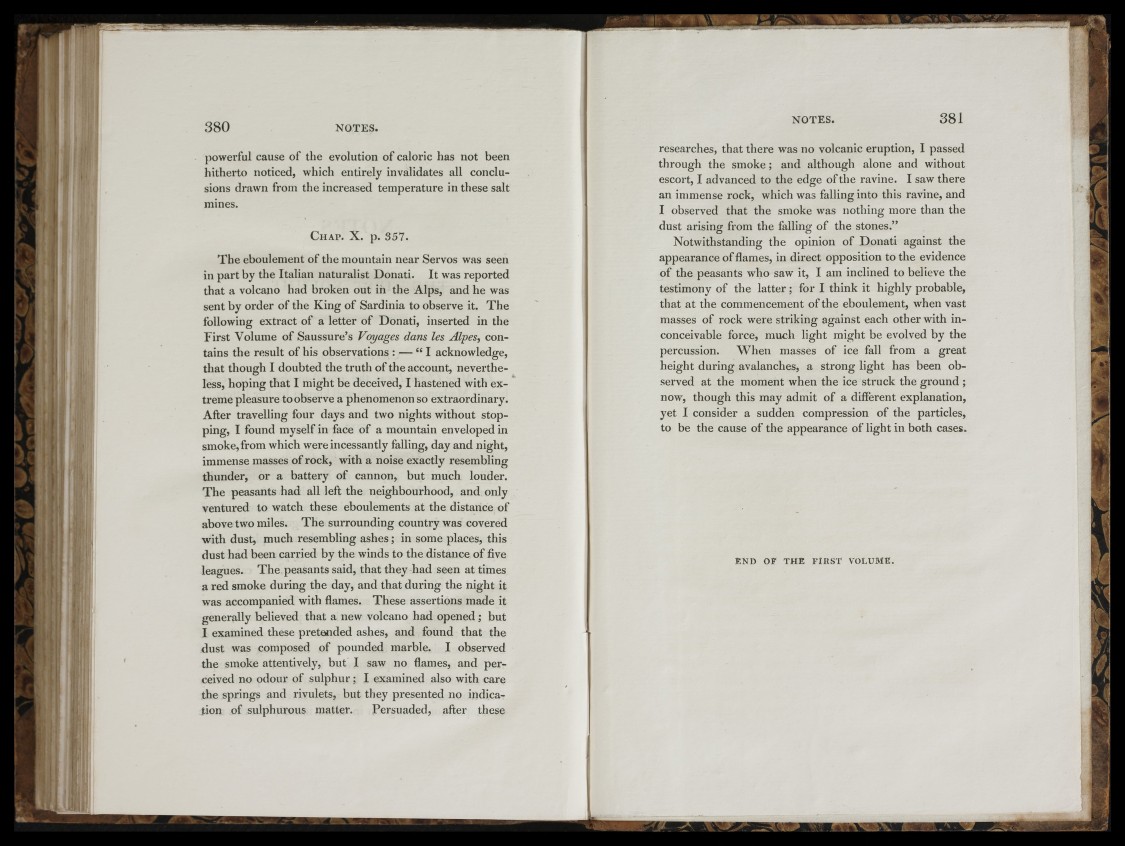
}
II
powerful cause of the evolution of caloric has not been
hitherto noticed, which entirely invalidates all conclusions
drawn from the increased temperature in these salt
mines.
C h a p . X. p. 357.
The eboulement of the mountain near Servos was seen
in part by the Italian naturalist Donati. It was reported
that a volcano had broken out in the Alps, and he was
sent by order of the King of Sardinia to observe it. The
following extract of a letter of Donati, inserted in the
First Volume of Saussure’s Voyages dans les Alpes, contains
the result of his observations : — “ I acknowledge,
that though I doubted the truth of the account, nevertheless,
hoping that I might be deceived, I hastened with extreme
pleasure to observe a phenomenon so extraordinary.
After travelling four days and two nights without stopping,
I found myself in face of a mountain enveloped in
smoke, from which were incessantly falling, day and night,
immense masses of rock, with a noise exactly resembling
thunder, or a battery of cannon, but much louder.
The peasants had all left the neighbourhood, and only
ventured to watch these eboulements at the distance of
above two miles. The surrounding country was covered
with dust, much resembling ashes; in some places, this
dust had been carried by the winds to the distance of five
leagues. The peasants said, that they had seen at times
a red smoke during the day, and that during the night it
was accompanied with flames. These assertions made it
generally believed that a new volcano had opened; but
I examined these pretMided ashes, and found that the
dust was composed of pounded marble. I observed
the smoke attentively, but I saw no flames, and perceived
no odour of sulphur; I examined also with care
the springs and rivulets, but they presented no indication
of sulphui'ous matter. Persuaded, after these
researches, that there was no volcanic eruption, I passed
through the smoke ; and although alone and without
escort, I advanced to the edge of the ravine. I saw there
an immense rock, which was falling into this ravine, and
I observed that the smoke was nothing more than the
dust arising from the falling of the stones.”
Notwithstanding the opinion of Donati against the
appearance of flames, in direct opposition to the evidence
of the peasants who saw it, I am inclined to believe the
testimony of the latter ; for I think it highly probable,
that at the commencement of the eboulement, when vast
masses of rock were striking against each other with inconceivable
force, much light might be evolved by the
percussion. When masses of ice fall from a great
height during avalanches, a strong light has been observed
at the moment when the ice struck the ground ;
now, though this may admit of a different explanation,
yet I consider a sudden compression of the particles,
to be the cause of the appearance of light in both cases.
END OF t h e f i r s t VOLUME.
F '
I;
rl •)!